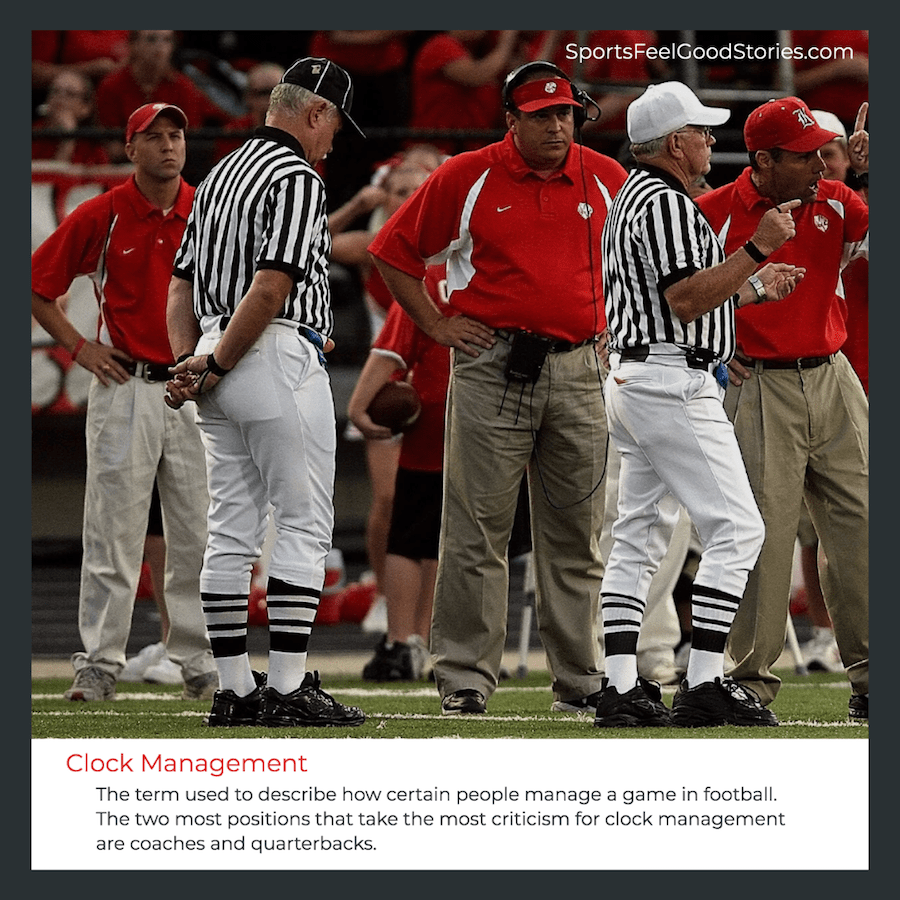What is clock management in football?
The definition of football clock management is how the coach and quarterback manage the time in a game. Well-orchestrated time management results in a scoring play for the offense. Ideally, it also leaves little time on the clock for the opposition to respond.
Key Takeaways
- Coaches are usually the ones in charge of calling timeouts and playcalling. Quarterbacks are in charge of executing plays in specific ways to give their team the best opportunity to win.
- The end of the half and the game is when clock management skills are put to the test.
- Quarters count down from 15 minutes. Both teams get three timeouts each half, while each play has a 40-second play clock.
- The clock stops if a ball carrier runs out of bounds in the last two minutes of the first half of the last five minutes of the second half, a pass is incomplete, or if a team calls a timeout. It also stops after each time a team scores. The clock will continue running once a player touches the ball after a kickoff.

Why does the clock stop in football?
The clock stops in football whenever a pass is incomplete, the ball-carrier runs out of bounds, or a team calls a timeout. When players run out of bounds, the clock will only stop in the final two minutes of the first half and the last five minutes of the second half. The clock will restart once the officials spot the ball.
Why does the clock not stop when out of bounds?
Even when players step out of bounds, the referee deems that the ball carrier’s forward momentum is stopped while still in bounds. Even though a player steps out without being tackled, that doesn’t mean the clock will stop.
Does the clock stop for penalties?
The clock will stop for penalties but restart once the ball is spotted with the penalty yards counted. Also, if the defensive team commits a penalty before the snap inside the last 40 seconds of either half, the half will end unless that team has a timeout or if the offense decides to let the clock start on the snap.
Does the clock stop when teams score?
The clock does stop whenever a team scores. Whether it is a touchdown, field goal, or safety, the clock will stop until the kickoff, when the clock will restart once a player touches the ball outside of the end zone after the ball is kicked off. Extra point attempts and touchbacks don’t run any time off the clock.
How do teams control the clock?
Teams can control the clock by stopping the clock by calling timeouts, spiking the ball, throwing incomplete passes, and completing passes but getting out of bounds. Teams can also control the clock by keeping the clock moving by running the ball while staying in bounds. Also, a team that avoids throwing incomplete passes and going out of bounds will keep the time running.
What is the 10 Second Runoff Rule in Football?
Any offensive foul used to conserve time – intentionally or not – is subject to a 10-second runoff of time. This rule applies after the 2-minute warning in both halves. A false start or illegal shift by the offense are a couple of examples of violations that would result in 10-second runoffs.
Other examples include:
- Intentional grounding,
- Illegal substitution, and
- Encroachment.
- Excess injury timeout – A player needs injury assistance, but the offensive team is out of timeouts.
The defense can take the yardage penalty and decline the time runoff. But, if the defense declines the yardage penalty, the time runoff must also be declined. The offense can negate the time runoff by calling a timeout if they have it.
If there are less than 10 seconds to play and the runoff is assessed, the half or game is deemed over.
Games lost by the 10-Second Runoff video
Two-Minute Drill
When teams are trailing and need to score, people refer to teams running the two-minute drill in the final two minutes of each half. This type of hurry-up offense is where teams put their clock management skills to test the most. This includes almost all passing plays where teams attempt to stop the clock as often as possible by getting out of bounds, throwing incomplete passes, and spiking the ball. Watch Tom Brady’s clock management in this drive.
Victory Formation
Teams already ahead in the minutes of a game will usually run the ball. Once teams reach a point where the other team can’t get the ball without a turnover, the offensive team will send their team into victory formation. The quarterback will kneel the ball until the clock expires.
Victory Formation video
Clock Mismanagement in the NFL
Clock mismanagement had been a common criticism for Kansas City Chiefs head coach Andy Reid. Until his Super Bowl LIV win, Reid had gained a reputation for his poor management in the playoffs.
Reid’s first trip to the Super Bowl came in 2005 when his Philadelphia Eagles team drew criticism for Reid’s failure to call timeouts. It led to their 24-21 defeat to the New England Patriots. Since then, Reid has also had troubles against the Patriots in the postseason until he finally got over the hump. First, he led his Chiefs team to a win over the Pats. Then, the Chiefs won the Super Bowl in February of 2020.
Criticism of Reid’s clock management has apparently dried up.

Overtime
You’re on our Football Clock Management page.
You might also be interested in:
A Drive Definition for Football
Football Receivers: Role, Types, FAQs
Punting: Best Punters in Football
